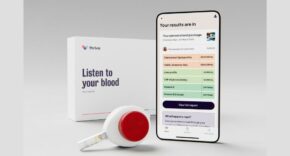 The use of an immersive virtual reality cycling technology has been shown to increase levels of physical activity and reduce feelings of pain, anxiety and depression in elderly people residing in care homes, according to a new study.
The use of an immersive virtual reality cycling technology has been shown to increase levels of physical activity and reduce feelings of pain, anxiety and depression in elderly people residing in care homes, according to a new study.
The study, “Combining physical, cognitive and social activity for older people and people with dementia”, was conducted by Motitech – a Norwegian health tech company operating in UK care homes – and funded by Sport England’s Active Ageing fund.
It found that using the virtual cycling technology, “Motiview”, led to 24% of participating care home residents moving from inactive to active during a three-month period and a 14% improvement in ‘general state of health’. The resulting increase in physical, cognitive and social activity drove statistically significant reductions in anxiety, depression and pain, as well as increased independence, and many of the improvements were still present at six months – three months after the intervention ended.
“Motiview” is an immersive health intervention that comprises an exercise bike that is specially adapted for those who have low functionality levels, videos of local roads and music that is familiar to the user. The video and sound are played through a TV to create a social setting that brings people together. The technology, designed to motivate users to exercise while also stimulating cognitive action and increased social interaction, has been developed by Motitech and the system is now being used in around 800 care homes across the UK, Nordics, North American and Australia.
Taking place over a six-month period, the study was based on objective activity data and validated questionnaires completed by 415 elderly residents across 25 UK care homes. Study authors pointed out that, considering that older people in care homes usually experience rapid health deterioration, with 6.2 diagnoses on average and an average length of stay sadly lasting only 26 months before they die, the results seen here are even more impressive.
The intervention was also found to have a very significant impact on care home staff, with team members reporting feeling much more motivated in their job and believing that the activity sessions had enhanced the staff environment.
As well as the study findings, the report also contained cost and benefits analyses, with the authors calculating a Return On Investment (ROI) of £31.50 for every £1 spent. In terms of benefits, with NICE using a threshold of £20,000 to £30,000 per Quality Adjusted Life Year (QALY) for technology appraisals, conservative calculations that incorporated all up-front costs rather than spreading them over a period of time, revealed that the Motiview achieved a cost per QALY of just £5,635.
Commenting on the study findings, Motitech’s market and business developer, Matthew Archer, said: “There are now around 500,000 care home residents in the UK and, over the last two decades, there has been a marked increase in disability and complex health problems. With an increasingly aged population, this trend is only going to continue and so it is clear that investment is needed into interventions that support proactive and preventative care.
“The results of this study show that immersive interventions like the Motiview, that combine physical, cognitive and social activity can achieve significant health outcomes, reducing pain, increasing independence and improving mental wellbeing for older people in care homes. Considering that this is a population that, by its nature, is unfortunately experiencing health deterioration all of the time, the improvements here are even more significant.
“With the study showing that the results are still felt by participants three months after the end of the programme, it is clear that engaging with interventions like this, even on a short-term basis, can have long lasting benefits for care home residents, staff and the healthcare system as a whole.”
The study was funded by Sport England through its Active Ageing fund, which supports innovative and experimental approaches that put older people at the heart of efforts to tackle inactivity. Motitech has been supported by Sheffield Hallam University’s Advanced Wellbeing Research Centre’s (AWRC) ‘Wellbeing Accelerator’.












